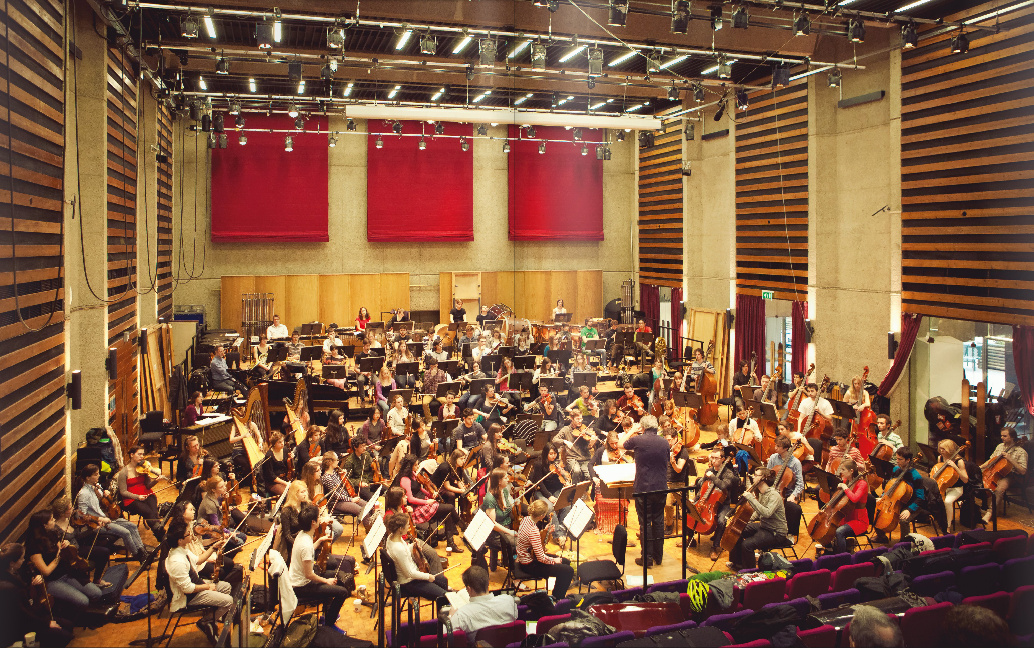Guildhall School of Music and Drama is one of the world’s leading music conservatories. Often described with words like “prestigious” and “prosperous,” the school is an institution, and their graduation ceremony (pictured here) looks more like a fictional scene in which everyone is about to be told that Dumbledore is dead. The school first opened its doors in 1880 to 62 part-time students in a disused warehouse in the City of London. Today, it is situated in the heart of one of Britain's most important arts venues at the Barbican, has more than 800 full-time music and drama students, and forms a creative alliance with the London Symphony Orchestra. Oh, and it just admitted its first rapper.Classical music has sometimes struggled with an image problem. For a young audience especially, the vast and dense worlds of Stravinsky and Beethoven can be daunting, impenetrable, and easily renounced as the intellectual property of older generations. But classical music is enjoying something of a renaissance this year, with multiple renovations made with youth culture firmly in mind. Boiler Room started running a series of classical shows in collaboration with the London Contemporary Orchestra and Radiohead’s Jonny Greenwood. The BBC launched a new initiative over the summer called “Ten Pieces,” which aims to get children directly involved with classical music at an elementary school level. Regardless of how you feel about them, Clean Bandit have the most streamed song of 2014. And hip-hop producers like D. Brooks Exclusive are cross-breeding their classical influences in a major way (Brooks himself has a background in viola and the distinction of being the only artist to have rubbed shoulders with the Chicago Symphony Orchestra and some of the hardest rappers in Chicago). Not to mention there's the fact that classical musicians clearly know how to party harder than the rest of us.Essentially, the cultural perspective of classical music is shifting, reflective of the evolution happening within the world of classical music itself. The fact that Guildhall enrolled a rapper to its Leadership Programme is not something to be overlooked. Until now, the closest connection Guildhall had to hip-hop was when former-student Dido collaborated with Eminem, so when the story broke that the institution responsible for training Bryn Terfel, Geoffrey Burgeon and (weirdly) Myleene Klass, would now be home to an MC from Haringey, everyone was naturally curious about how the hell that happened.
The student in question is 25 year-old Jack Derbyshire, who began rapping around the age of 14 under the solo moniker Jakaboski and within a collective called Strangelove. “I heard about Guildhall and the Leadership program through a friend,” he says, “I then met the course leaders for a chat and it went from there. The audition was tough. I was insecure about my lack of musical training, but it must have gone all right because I'm here now right?”I know the initial narrative sounds a little like Save The Last Dance in reverse, but the course Jack is enrolled in isn’t performance-based. Although he does collaborate heavily with other musicians, he doesn’t have a vocal coach himself. “It’s very practical,” he says, “We do a lot of different projects, for example this week I have been running workshops in a school in Tower Hamlets. We have creative labs where we make strange sounds with each other. I'd say its the perfect blend of practical and open ended experimentation.”Classical music is infamous for being rooted in tradition and structure, but that doesn’t mean the boundaries of classical music can’t be as fluid as they are with other genres. Joanna Newsom famously blends complex orchestrations with anti-folk sensibilities, idiosyncratic songwriter Sasha Saim composed for the London Symphony Orchestra by her early 20s, and most hip-hop artists are no stranger to an elaborate string section. In all instances, musical background collides colorfully with an appreciation of the classical or contemporary to create something explosive. The progressions being made are indicative not just of how the previously opposing worlds of classical and hip-hop are adapting, but of how we perceive genre boundaries in general. As with anything, the people instigating those changes are young musicians.“We have so much access now and musicians are cross pollinating all over the shop,” Jack says, “Certain artists have done a lot, J Dilla has influenced jazz musicians, and Flying Lotus, too, is like the musos' beat maker. People definitely care less about the idea of genre and thats good, it free's us up and allows us to try new things and new combinations.” But is there still a certain stigma attached to classical music?“People can feel like classical music is a bit conservative or elitist, but I know a lot of people and groups who are actively trying to change that. BBC proms is a great thing—cheap tickets to see amazing classical musicians in an amazing setting. We need more of that.”Follow Emma on Twitter.
Advertisement

 Image via
Image via